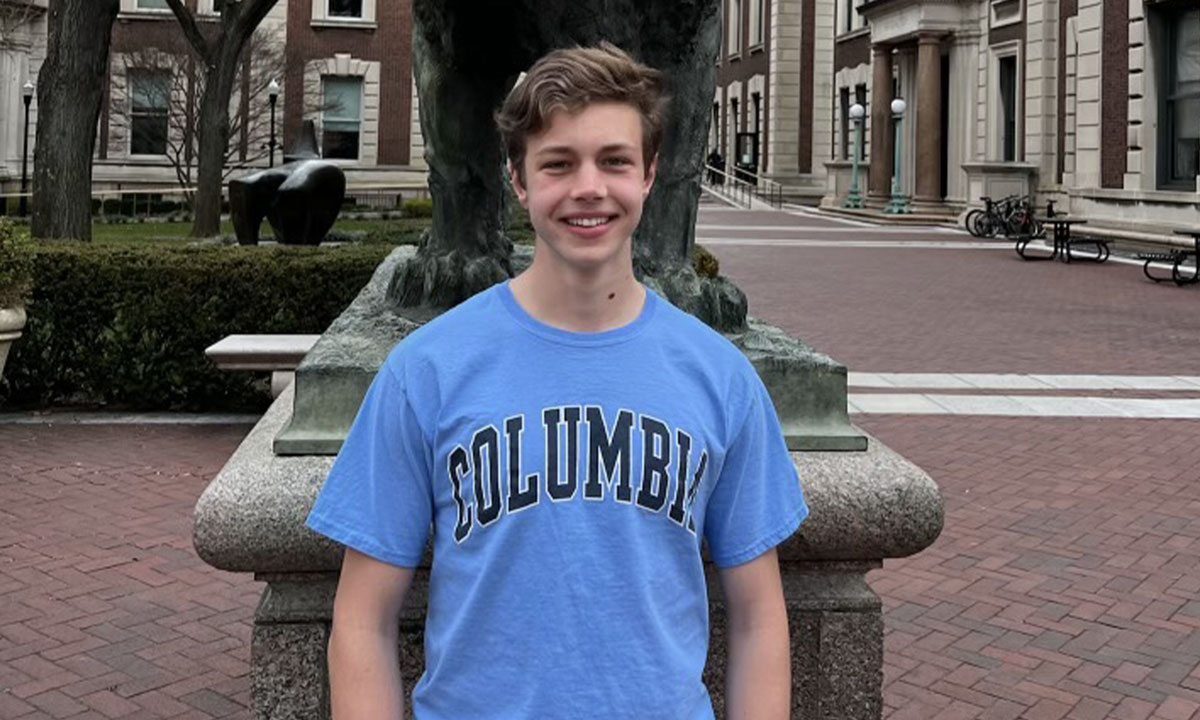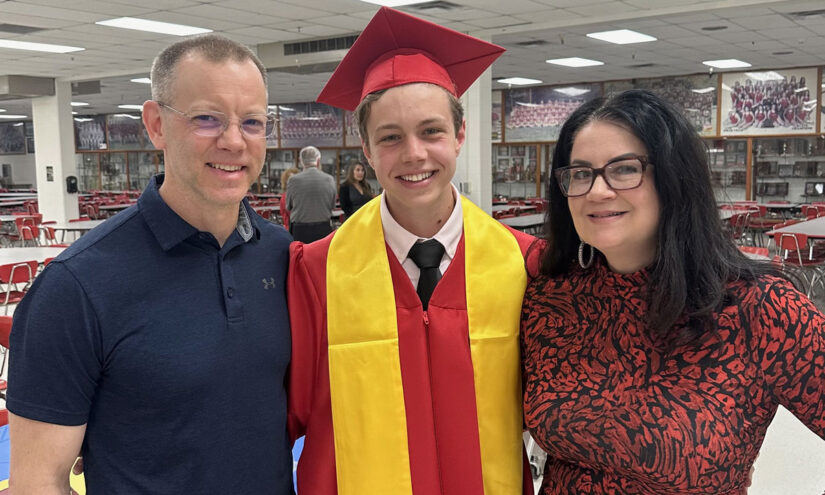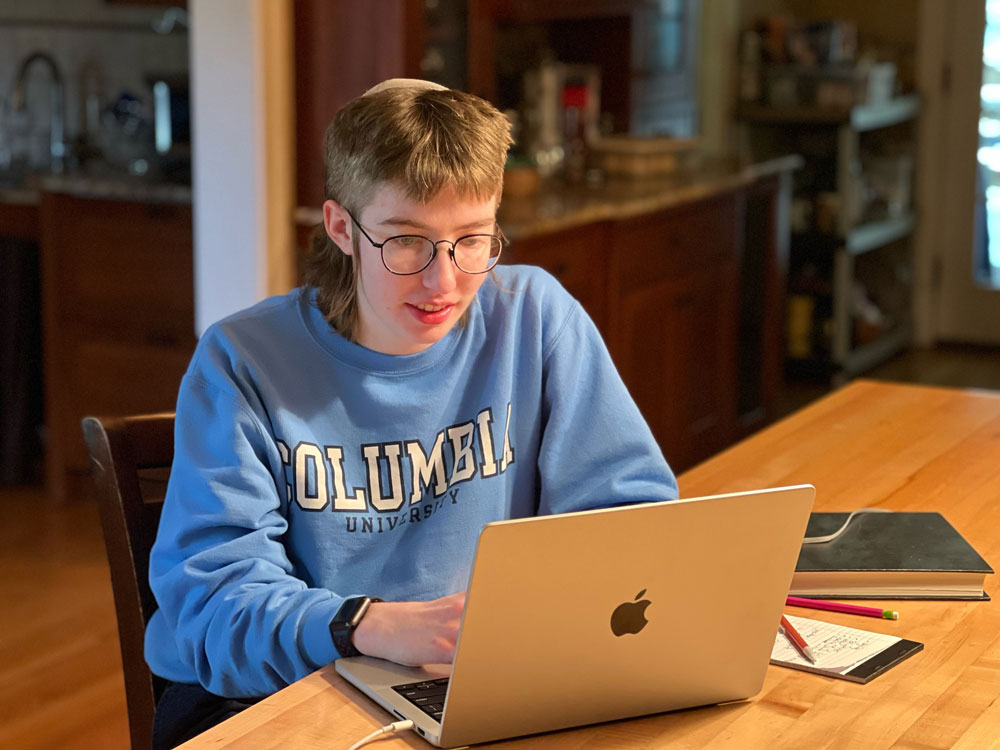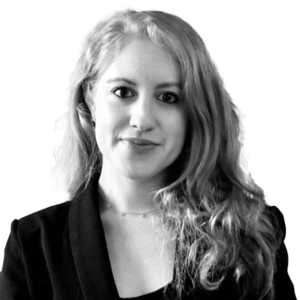High School Seniors Eye Campus Protests as High-Stakes College Decision Looms
As protests engulf college campuses, prospective freshmen forced to weigh their own appetite for student activism, police presence and sense of safety

Get stories like this delivered straight to your inbox. Sign up for The 74 Newsletter
Updated, May 6
With just a few hours remaining until the midnight deposit deadline, West Virginia high school senior Sam Dodson thought he knew which university he’d commit to for the fall but second thoughts were bubbling up. Accepted to a number of prestigious institutions, he had narrowed his final choice down to two: Columbia University and Dartmouth College.
There were multiple considerations at play: academic opportunities; social life; Manhattan’s Upper West Side vs. bucolic Hanover, New Hampshire. And over the past few weeks a new one had emerged: the quickly spreading pro-Palestinian campus protests and subsequent arrests for which Columbia was ground zero.
Dodson was one of these students, watching closely as protesters occupying Columbia’s Hamilton Hall were cleared from the building Tuesday by the New York Police Department..
“All of that made me wait until kind of the last minute to officially decide,” the track runner told The 74.
The class of 2024 has had a high school experience bookended by jarring national news, their freshman year coinciding with school shutdowns and COVID-era virtual learning and their senior year ending amid a volatile movement protesting Israel’s assault in Gaza that has swept up dozens of colleges and brought over 2,000 arrests, according to a CBS News tally. As seniors weigh options for their future universities, some are looking to the actions of college student activists and the responses of their respective administrations before making final decisions.
“I do think that all of the turmoil and things that are going on definitely had me reconsidering. It had me having second thoughts about different things and had me, I guess, take second looks at different schools,” Dodson said. “But ultimately I guess I tried to look past anything with that and understand that this is a choice I’m making for the next four years and what I think would be the best experience for me — academically, personally, in terms of just student life. All of those things.”
Dodson’s experiences are reflective of other students’ as well. Safa Al-Omari, a senior at NYC’s The Laboratory School of Finance and Technology told Chalkbeat she is still deciding between City College and Hunter College. The Yemeni student said she wants to do more research about City College’s response to the protests before she commits.
“Being Middle Eastern, I have a lot of feelings about what’s going on,” Al-Omari said. “I would not want to go to a college that is arresting students based on them speaking for people who are suffering.”
For Sam Dodson’s mom, Sarah, there were also conflicting emotions. “It’s very hard to put the ‘yes’ when you have a lot of … chaos,” she said. While she said her son was drawn to the diversity of perspectives on Columbia’s campus, the more heated elements of the past few weeks have given him pause. At the same time, she emphasized the importance of being in a higher education space where free speech is strongly respected and encouraged.
“You never want your kid to go to a school that is on the national news because of police involvement, right? It just doesn’t sit really well,” she said. “However, I guess I am under the assumption that there’s going to be resolution … I’m guessing because this is a college platform that they are going to hopefully have more engaging, open conversations so that there can be some sort of — I don’t know — persistence of everyday campus life that is not so inflamed.”
For now, all academic activities on Columbia’s Morningside Heights campus — including finals — have been moved fully remote for the remainder of the semester. On May 6, the school announced its decision to cancel the university-wide commencement scheduled for May 15 and instead focus on school-level graduation ceremonies. The NYPD had been asked to maintain a police presence until two days after the main commencement; it was not immediately clear how the cancellation might impact that.

Sam Dodson, who began his freshman year of high school in hybrid learning, said it would be frustrating if his first year of college classes also goes remote because of campus unrest. On the other hand, “there’s something interesting about being in the center of the news or the center of exactly what’s happening.”
Students reconsider and recommit
It was about two week after pro-Palestinian students and activists on Columbia’s campus first erected the “Gaza Solidarity Encampment” that a group occupied Hamilton Hall, a building with a long history of student takeovers. Hours later, the cops moved in, arresting, they said, 112 people, including 32 who were not affiliated with the university.
By this point, the movement had spread across the country, including to Dodson’s other contender, Dartmouth, where nearly 100 protesters were arrested this week. About a week and half before that escalation, Columbia hosted its accepted students weekend and Dodson was there.
He took some time, he said, to wander around campus and speak with protesting students near the encampment. “They were like, ‘Hey, new Columbia students. Come talk to us!’ You know, I guess, they were very like welcoming. They were very much wanting to talk with the admitted students, which I thought was a nice thing.”
While he was disappointed that many of the accepted student weekend activities had been canceled or modified, he was grateful he got to experience the events on campus firsthand and form his own views.
Around the same time, another high school senior Lila Ellis, who uses they/ them pronouns, was also closely observing the activities on Columbia’s campus. A Jewish student from Massachusetts, they had committed months before to List College, the dual-degree joint program between Columbia University and the Jewish Theological Seminary.

Ellis said that because of their religion, they’re concerned there are certain places on campus they won’t be welcomed. “I think that to just stay away from all secular extracurriculars entirely, is a disservice to myself and to the community as a whole,” they said. “And I’m just thinking about, like, how am I going to balance that while also, you know, recognizing that some spaces don’t want me in them?”
Ellis pointed to the example of a protester outside the gates of campus shouting, “Go back to Poland,” at Jewish students. Recently, a January video of one of the student protest leaders, Khymani James, began circulating in which he said, “be grateful that I’m not just going out and murdering Zionists.” He has since been barred from campus and released a statement of apology.
Notably, as reported by The New York Times, protests within the encampment were on the whole peaceful and included Jewish students, though others on campus agreed with Ellis that anti-Zionist rhetoric made them feel unwelcomed.
While Ellis is sticking with their decision to attend Columbia, they did briefly toy with the idea of a gap year or of moving core curriculum requirements around to stay away from the main campus for a while.
“I really do want to be in this program,” they said, “And it’s just a matter of thinking about ‘How do we make that work with what’s happening at Columbia?’ rather than ‘Can it work?’ Because I think it can work.”
As Ellis prepares to enroll for classes — especially literature overview courses on Columbia’s campus — they’re considering a number of factors including whether or not the professors taught from the encampment.
“Hopefully,” they said, “it’s not an issue in the fall, but just thinking about who were the professors who were willing to do that? And is that an environment that I want to be in for learning and for having an open discussion?”
Their father, Andy Ellis, added his own apprehension. All parents, he said, are nervous to send their first child off to college. But the protests on campus, he said, add an extra dimension, especially for a Jewish student.
Ellis, a graduate of MIT, has spent significant time in higher education. He said he was on a Harvard visiting committee and in an academic center there for the last decade but resigned from both positions in October, “when it became clear that people were ripping off their mask around anti-semitism.”
He said that if he were a current student on Columbia’s campus, he would be on the front lines of the counter-protests, displaying footage from Hamas’s Oct. 7 terror attack on Israel.
“I think I would be that person,” the consultant said, “But I know that Lila is not that person. But I also know that Lila is not going to just duck [their]head and stay completely quiet, but I think find a balanced view. Listening to what Lila said about, you know, ‘find the humanity’ is an amazing, generous take. I’m really proud that I think we’ve created somebody who has a better moral compass than I do because I’m a lot more angry.”
Back in West Virginia and with time to spare before Wednesday’s midnight deadline, Dodson had finalized his decision: He committed to be a member of the class of 2028 at Columbia where he plans to study political science and government.
“I think it’ll just be interesting,” he said, ”to go from — to take my perspective from this kind of small town area where like, I mean, I’ve met people from other places. I try to read, I try to keep myself exposed to those things, but it’d be cool to actually meet people from all sorts of perspectives and all sorts of backgrounds.”
Get stories like these delivered straight to your inbox. Sign up for The 74 Newsletter

;)
